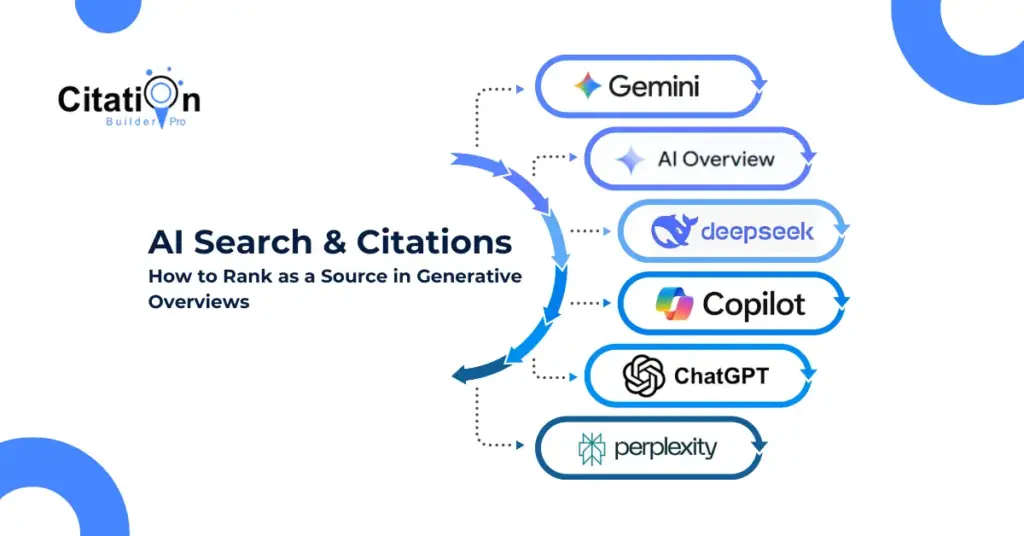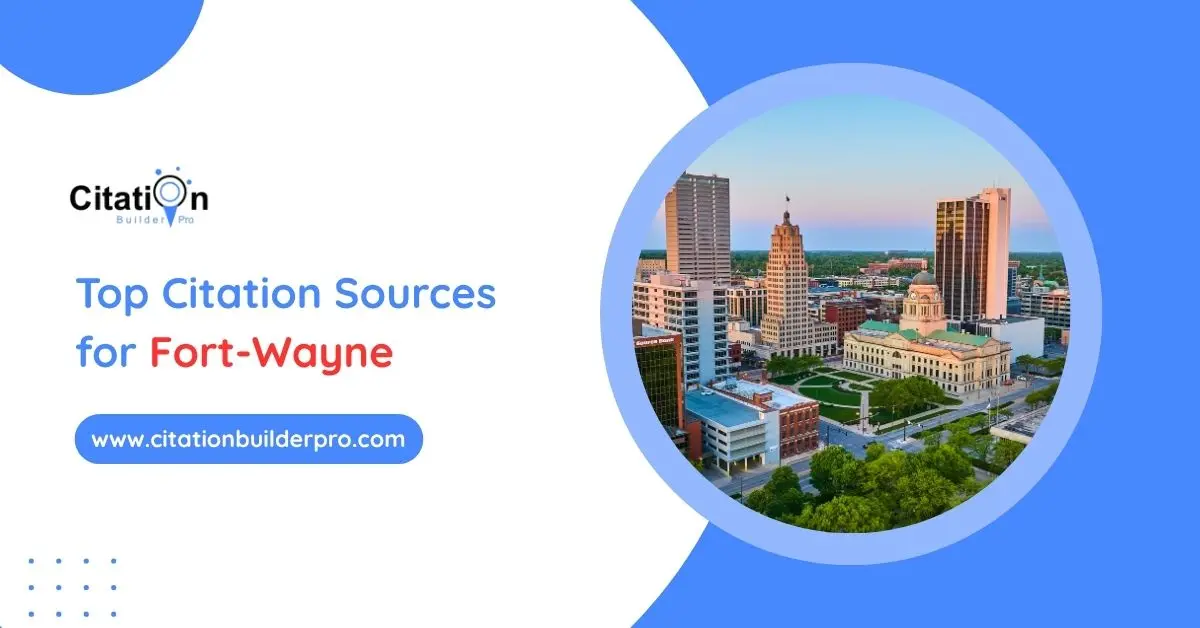Table Of Contents
TL;DR
AI search isn’t guessing it’s citing.
Here’s what’s really happening right now:
- 86% of AI citations come from sources you already control your website, listings, and reviews.
- ChatGPT pulls up to 70% of its local data from Foursquare, proving old directories still matter.
- Yelp shows up in about a third of AI searches, and even MapQuest plays a role.
- Your website is still the most trusted data source across every AI platform.
- Different AIs, different habits: Gemini prefers websites, ChatGPT leans on listings, and Perplexity mixes both.
Citations are back. If your business info is clean, structured, and everywhere AI looks, you’ll show up where the future of search happens.
Here’s What’s Changing with AI Search
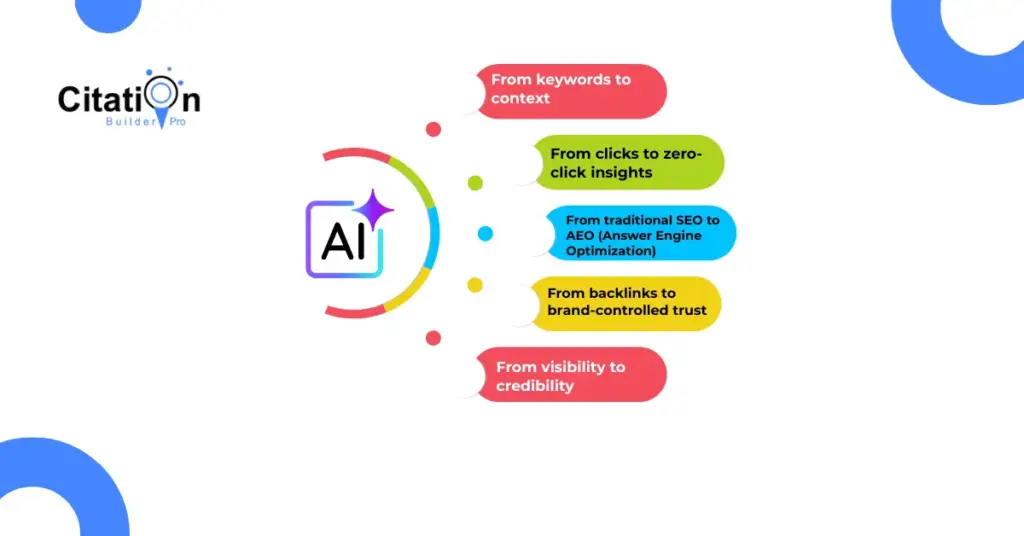
Search is no longer just a list of blue links. It has become a live, conversational experience. In 2025, Google introduced AI Overviews and a new AI Mode, both powered by the Gemini 2.5 model. These updates completely changed how people search and how results are displayed. Instead of scrolling through multiple results pages, users now get AI-generated summaries that compile insights from several trusted sources in seconds.
Here’s the thing: AI search is built on citations, not just links. When Google or ChatGPT displays an AI Overview, it does not guess the answer. It references verified business listings, trusted websites, and recognized directories that provide structured and reliable data.
The Major Shifts:
- From keywords to context: Users now ask natural questions such as “best vegan café open now in Austin,” and AI engines pull answers directly from structured business data like websites, Google Business Profiles, and directories. Maintained through data entry services to ensure accuracy and visibility.
- From clicks to zero-click insights: AI Overviews often satisfy the query right on the search page. You only get cited if your information is credible, crawlable, and well-structured.
- From traditional SEO to AEO (Answer Engine Optimization): Businesses must now optimize not just for search engines but also for AI systems that summarize and cite data.
- From backlinks to brand-controlled trust: Studies from Yext and Search Engine Land show that 86% of AI citations now come from brand-owned or managed assets such as websites, listings, and reviews, not from forums or random discussions.
- From visibility to credibility: Google’s AI models now favor high-quality, structured, and accurate content that demonstrates.
What this really means is that AI search visibility depends less on who links to you and more on who trusts your data.
If your listings, directories, and website contain consistent, structured, and verifiable information, AI systems will recognize you as a reliable source. If your information is outdated or inconsistent, you risk being invisible in this new AI-driven search ecosystem.
What This Really Means: Citations Are Visibility Signals Now
What this really means is citations aren’t just about rankings anymore they’re about recognition.
When an AI model or search engine “cites” your business, it’s using that mention as a trust signal, not just a directory entry. These citations tell AI systems that your business is real, active, and consistent wherever it appears online.
In the world of AI search, visibility doesn’t come from backlinks alone. It comes from data integrity how often your business is mentioned across credible platforms like Google Business Profile, Yelp, Foursquare, and industry directories, and whether that information matches your website.
When those mentions line up, they create a web of validation that AI models understand. It’s how systems like ChatGPT, Gemini, and Perplexity decide which businesses to cite in their results.
In short:
- Citations are proof of credibility, not just technical SEO assets.
- AI systems treat consistent business mentions as verification points before surfacing your name.
- The cleaner and more widespread your citations, the higher your chances of being cited or summarized in AI search results.
So, while traditional SEO chases clicks, AI-driven visibility chases confidence and citations are how you earn it.
AI Is Favoring Brand-Controlled and Verified Sources
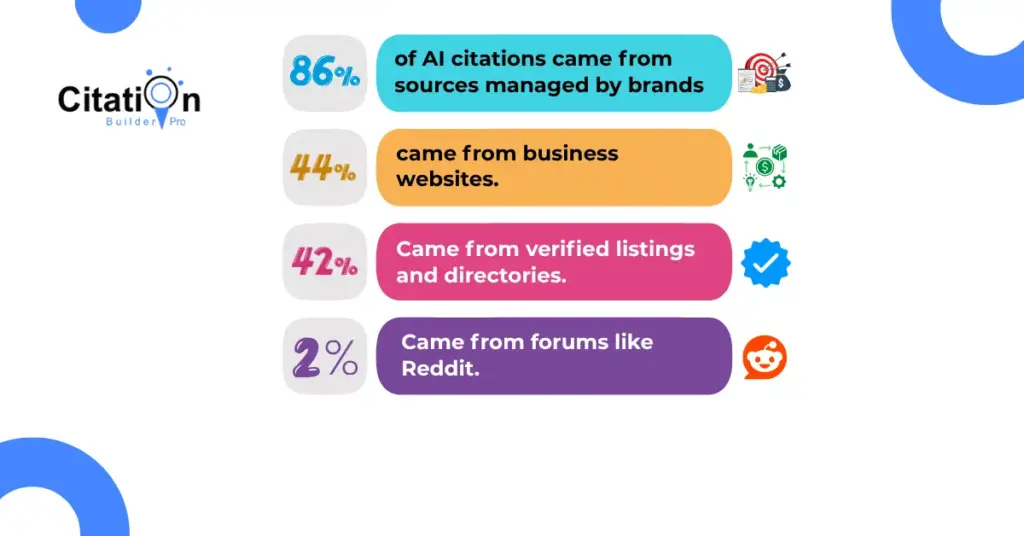
Let’s be clear: AI doesn’t trust everything it finds online, it trusts what it can verify.
Recent research confirms that AI models like ChatGPT, Gemini, and Perplexity rely mostly on brand-controlled content rather than random discussions or forum threads. A major Yext study (October 2025) analyzed 6.8 million AI citations and found something remarkable:
- 86% of AI citations came from sources managed by brands.
- 44% came from business websites.
- 42% came from verified listings and directories.
- Just 2% came from forums like Reddit.
That flips the narrative completely. For years, marketers assumed AI was heavily influenced by user-generated content. In reality, AI engines are designed to prioritize accuracy, authority, and freshness which means they pull from data sources that businesses control directly.
Here’s what’s driving that shift:
- Reliability matters: AI systems are built to reduce misinformation, so they favor sources that are credible, structured, and updated regularly.
- Structured data wins: Websites and listings that use schema markup make it easy for AI to read and reuse their content confidently.
- Authority is measurable: Signals like E-E-A-T (Experience, Expertise, Authoritativeness, Trustworthiness) help AI models decide which sources to surface.
- Different models, different habits: Google’s Gemini leans toward websites, OpenAI’s ChatGPT relies heavily on listings, and Perplexity spreads across both.
What this really means is that you already control most of the assets AI trusts your website, your listings, and your reviews. Keeping them optimized, structured, and consistent gives you a direct line into how AI systems find and cite information.
In other words, AI visibility isn’t about chasing backlinks anymore. It’s about building a web of truth that AI can verify without hesitation.
Directories and Listings: The Unsung Heroes of AI Search
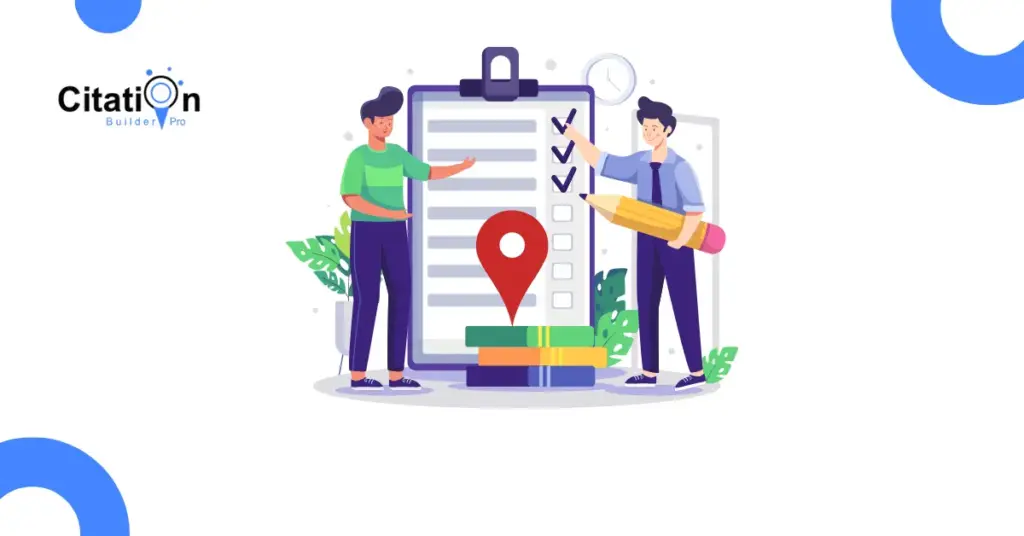
If there’s one thing AI search has made clear, it’s this: directories are back in the spotlight.
AI models like ChatGPT, Perplexity, and Google’s AI Overviews don’t pull data from random corners of the internet. They rely on structured, verified, and context-rich data and directories provide exactly that.
Unlike traditional web crawlers that rank pages based on keywords, AI search engines use context and relationships to understand information. That’s why directories like Yelp, Foursquare, Google Business Profile, and Apple Maps are now essential data sources. They organize the web into clean, machine-readable formats that AI systems can trust.
Why Directories Matter to AI
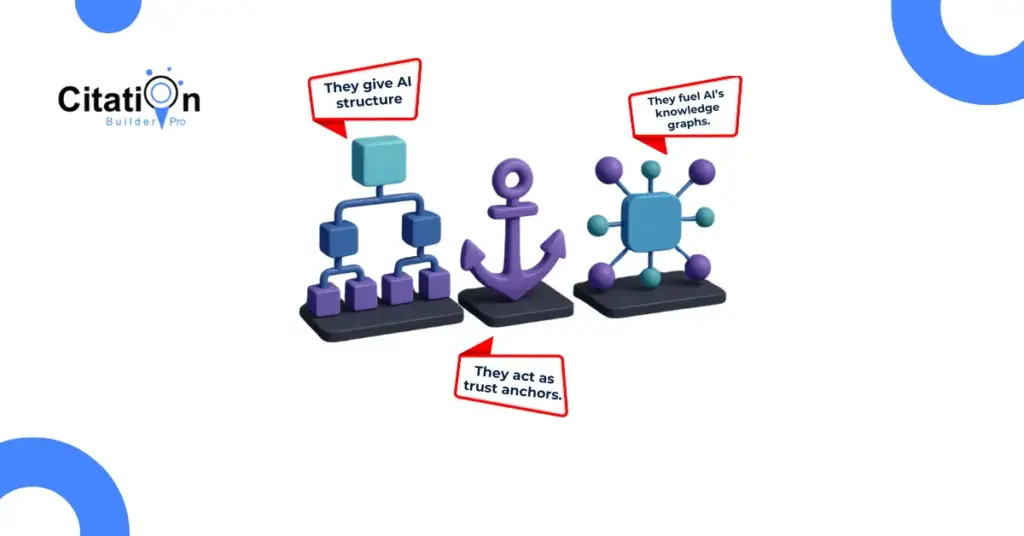
- They give AI structure. Directories organize businesses into clear categories with accurate names, addresses, and contact details. This helps AI models understand what your business does and where it belongs.
- They act as trust anchors. Platforms like Yelp and Foursquare have years of user data, reviews, and verification systems that signal reliability to AI.
- They fuel AI’s “knowledge graphs.” Consistent directory data helps LLMs map connections between entities, businesses, locations, and industries so they can confidently generate accurate answers.
How to Stay Visible in AI Search
- Keep your NAP consistent. Your Name, Address, and Phone number must be identical everywhere on your website, GBP, Apple Maps, Yelp, and niche sites.
- Prioritize authoritative directories. Focus on the platforms that AI actually uses instead of mass-submitting to low-quality ones.
- Audit your listings regularly. Outdated hours or mismatched details can lead AI to ignore or misinterpret your business.
- Use schema markup on your site. Structured data helps AI connect your website with your directory listings, strengthening entity recognition.
Directories may not be flashy, but they’re the backbone of AI-driven local discovery. Treat them like your AI foundation layer because that’s exactly what they’ve become.
Your Website: The Most Trusted Data Source
Here’s what most people overlook: your website is still the single most trusted source of truth for AI systems.
While directories like Yelp or Foursquare help AI models verify business information, they ultimately cross-check everything against your own site. In every major study, including BrightLocal’s and Yext’s 2025 reports, business websites appeared as the top citation source across all industries and platforms.
That means when AI platforms like ChatGPT, Gemini, or Perplexity can’t confirm details from external listings, they turn directly to your website for verification. It’s your digital headquarters the place AI trusts most when summarizing and citing information.
Why Your Website Matters in AI Search
- It’s your primary data authority. Everything from your Name, Address, and Phone number (NAP) to your services and hours lives here. AI engines use that information to validate and complete your profile across the web.
- It provides structured clarity. Adding schema markup (like LocalBusiness, Organization, and FAQPage) makes your content machine-readable, helping AI confidently extract and reuse your data.
- It reinforces credibility. Google’s E-E-A-T principles Experience, Expertise, Authoritativeness, and Trustworthiness apply directly to your site’s content, design, and accuracy.
- It bridges all your listings. When your site links to your Google Business Profile, Yelp, and niche directories, it helps AI connect those dots into one unified entity.
What You Should Do
- Audit your website’s NAP details; they must match your directory listings exactly.
- Add structured data markup using tools like Google’s Structured Data Testing Tool or Schema.org guidelines.
- Keep your site updated with service details, photos, FAQs, and reviews. Outdated pages make AI less confident in citing you.
- Use plain, descriptive language. AI models interpret clear, human-written content more accurately than keyword-stuffed text.
In short, your website isn’t just a marketing asset anymore it’s your source of truth for AI search.
If it’s well-structured, accurate, and up to date, it becomes the reference point for how AI understands, cites, and presents your business online.
Action Plan: How to Rank as a Cited Source in AI Overviews
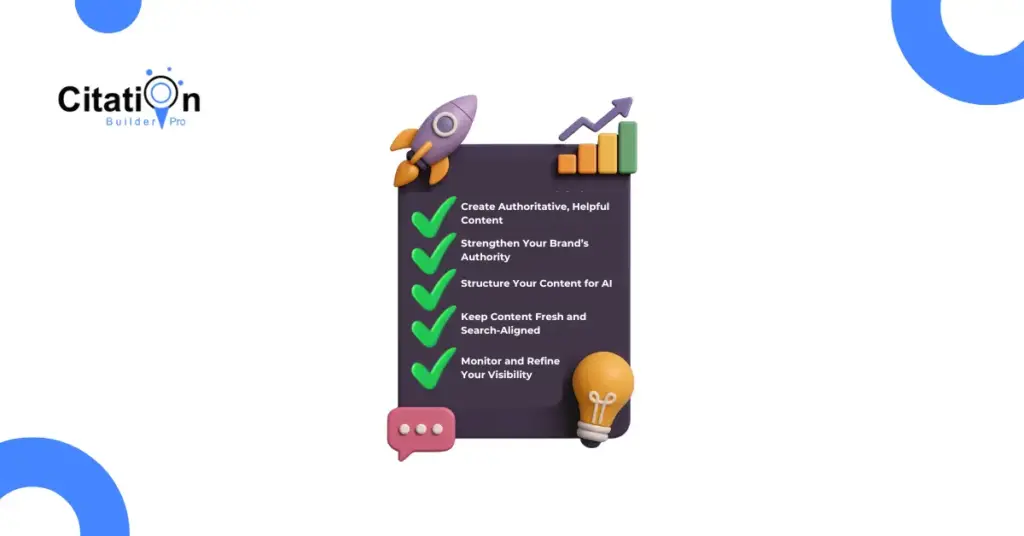
Here’s where things get practical.
If you want your business to appear as a trusted source in Google’s AI Overviews, ChatGPT Search, or Perplexity, you need to make your content easy for AI systems to understand, verify, and trust.
AI Overviews don’t just summarize the web they select and cite content that looks accurate, helpful, and well-structured.
1. Create Authoritative, Helpful Content
AI models prioritize expert-driven, clearly written information that answers real user questions.
Focus on informational content like guides, FAQs, and comparisons that solve specific search intents.
Demonstrate expertise and author credibility include author bios, credentials, or brand context where relevant.
Avoid fluff. Write naturally and conversationally so AI can easily interpret and extract meaning.
2. Strengthen Your Brand’s Authority
AI prefers information from brands it recognizes and trusts.
Build your E-E-A-T signals (Experience, Expertise, Authoritativeness, Trustworthiness) through accurate content, citations, and consistent branding.
Earn mentions from reputable sites through guest articles, PR, or industry features.
Keep your reviews positive and active customer feedback is one of the most powerful trust signals AI uses.
3. Structure Your Content for AI
Even the best content won’t get cited if AI can’t read it clearly.
Use descriptive headings (H2/H3), bullet points, and question-based formatting to make your content easy to scan.
Add schema markup (Article, FAQPage, LocalBusiness) so AI systems can identify entities, topics, and relationships.
Include internal links to connect related topics this helps AI understand your topical depth.
4. Keep Content Fresh and Search-Aligned
AI models prefer recent, relevant information.
Update your content regularly, especially stats, pricing, and data-based claims.
Use long-tail, informational keywords that match conversational queries like “how to,” “what is,” and “why does.”
Add a visible “Last Updated” date to signal freshness to AI crawlers.
5. Monitor and Refine Your Visibility
Track whether your content appears in AI Overviews or generative summaries.
Use tools like Perplexity or ChatGPT Search to see if your site is being cited.
Watch Google Search Console for query-level traffic shifts this can hint at AI Overview visibility changes.
The takeaway:
Getting cited by AI isn’t luck it’s structure, clarity, and consistency.
If your content is factual, easy to parse, and trusted across the web, AI systems will do the rest.
Keep Tabs: How to See If AI Is Citing You
Here’s the reality: tracking AI citations isn’t as simple as checking backlinks or mentions in Google Analytics.
AI models don’t always show where their information comes from and sometimes they even generate “citations” that don’t exist.
Still, there are smart ways to spot if your business, website, or listings are being referenced by AI tools and to monitor how visible you are in this new search ecosystem.
1. Test AI Platforms Manually
The easiest way to start is by running real searches on the AI tools your customers might use.
Try conversational queries like:
- “Best plumbing company in Austin”
- “Top-rated dentist in Denver”
- “Does [Your Business Name] offer 24-hour service?”
Check the results on:
- Perplexity – it shows a clear list of cited sources at the bottom of each answer.
- ChatGPT Search (with browsing) – it often links to data sources used for its responses.
- Google AI Overviews – see if your business appears in the summary or citation carousel.
If your site or listings show up, that means AI systems are already treating your data as trustworthy.
2. Monitor Mentions with Citation Tools
Platforms like Yext Scout and Citation Builder Pro’s Citation Tracker are now building features that track AI visibility.
These tools can help you see:
- Which directories and aggregators (like Foursquare or Yelp) are feeding AI search data.
- Whether your listings are being synced and cited correctly.
- Inconsistencies in your business information that could prevent citation.
Staying consistent across listings isn’t just for local SEO anymore it directly affects whether AI recognizes your brand.
3. Use Manual Spot Checks and Phrase Searches
If you’ve published content (like blog posts or guides), take a few distinct sentences and search them in quotes on Google.
This can help you find whether your content or data has been reused, summarized, or cited by AI platforms or third-party aggregators.
4. Track Visibility Shifts
You might not see “AI citation” metrics in analytics yet, but indirect indicators can still tell the story:
- Sudden increases in impressions for informational queries.
- New traffic spikes from brand searches.
- Changes in how AI summaries describe your brand or industry.
Regularly testing your brand visibility in AI Overviews, Perplexity, and ChatGPT will give you a clearer sense of how AI perceives and cites your data.
The Future of SEO Is AI Citation Visibility
Here’s the truth: the future of SEO isn’t just about ranking, it’s about being cited.
We’re entering an era where AI citation visibility is the new measure of online authority. Traditional SEO still matters, but as AI-powered platforms like Google’s AI Overviews, ChatGPT Search, and Perplexity become mainstream, visibility is shifting from search results to AI-generated summaries.
From Rankings to References
In the old SEO model, success meant showing up on page one. In the new model, it means showing up as a cited source in AI answers.
AI systems don’t simply list links; they summarize information and credit the data they trust most. That’s why brand-controlled, structured, and fact-rich content has become the foundation of modern visibility.
If your content is clear, accurate, and well-structured, AI can easily reuse and attribute it. But if your site is cluttered, unstructured, or outdated, it’s invisible to AI.
Structured Data Is the New SEO Backbone
Schema markup and clean information architecture are no longer optional. They’re how you “speak AI.”
Adding structured data such as Article, FAQPage, LocalBusiness, and Organization helps AI understand what your page is about, who you are, and when to cite you.
Think of it as writing your content in a way both humans and machines can understand Generative Engine Optimization (GEO) in action.
Content Authority and Trust Lead the Way
AI-driven visibility depends on credibility, not keyword density.
- Publish original, fact-checked content that reflects real expertise.
- Keep your pages updated with current information and data.
- Showcase author credentials and company authority.
- Maintain consistent citations across your listings and web presence.
The more accurate and trustworthy your data, the more AI engines treat it as reference material.
The Metrics of Tomorrow
Clicks and rankings will always matter, but new KPIs are emerging:
- Citation frequency: How often your content appears in AI Overviews or Perplexity summaries.
- Entity visibility: How clearly AI systems recognize your brand as an authority in its niche.
- Generative reach: How often AI search tools pull data from your pages when users ask industry-related questions.
These metrics represent the next evolution of SEO where visibility is earned through trust, not tricks.
What This Means for Businesses
For agencies and local brands alike, success will come from blending traditional SEO with AI-first optimization.
- Continue ranking for search, but build with AI in mind.
- Treat structured data, verified listings, and authoritative content as your core visibility assets.
- Measure not just where you rank but where you’re referenced.
AI search is rewriting the rulebook. The brands that adapt now will own the conversation tomorrow.
Get Your Business Cited by AI - The Smart Way
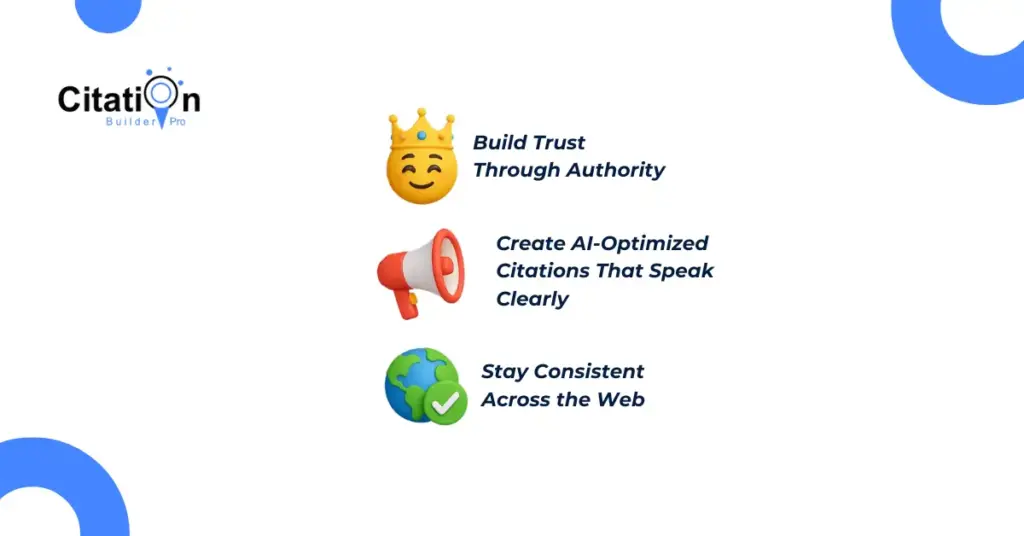
AI search isn’t the future, it’s already redefining how customers discover local businesses.
If you want your brand to appear in AI-generated overviews, summaries, and chat responses, you need to give AI what it values most: clarity, credibility, and consistency.
1. Build Trust Through Authority
AI systems rely on trust signals to decide which sources to cite.
- Earn positive reviews on platforms like Google Business Profile, Yelp, and industry directories they help AI recognize your brand as reliable.
- Publish expert-driven content that showcases real experience and includes author or brand credentials.
- Get your business mentioned on authoritative directories, local blogs, and industry sites to strengthen your brand’s credibility footprint.
2. Create AI-Optimized Citations That Speak Clearly
Here’s where Citation Builder Pro makes a real difference.
We don’t just list your business, we create LLM-optimized descriptions for every citation.
These descriptions are written using natural, AI-readable language generated through large language model (LLM) queries, helping search engines and AI tools like ChatGPT, Gemini, and Perplexity understand your business context more precisely.
This approach improves:
- How AI interprets your services and location relevance.
- How often your listings appear in AI-driven summaries or local recommendations.
- The overall semantic quality of your citations across all platforms.
So instead of duplicate directory text, every listing communicates your brand story in a way AI can understand, index, and cite.
3. Stay Consistent Across the Web
AI doesn’t just check your website it checks your entire digital footprint.
That’s why consistency is non-negotiable.
- Use Citation Builder Pro’s Citation Audit Tool to find and fix incomplete, outdated, or mismatched listings.
- Keep your Name, Address, and Phone (NAP) identical across Google, Yelp, Apple Maps, and niche directories.
- Update your Google Business Profile with new hours, services, and images AI prefers current, verifiable data.
A consistent online profile helps AI models connect the dots between your website, listings, and reviews making your brand a more reliable source for generative search engines.
Frequently Asked Questions (FAQs)
1. What are AI citations and why are they important for SEO?
Ans: AI citations are references used by AI search engines like ChatGPT, Gemini, and Perplexity to verify business information. They act as trust signals, helping AI determine which brands are reliable enough to cite in search summaries. Consistent, structured citations across your website, Google Business Profile, and directories improve your AI visibility and local SEO rankings.
2. How does AI search decide which businesses to cite?
Ans: AI search platforms cite brand-controlled and verified sources, not random websites. Studies show 86% of AI citations come from business websites and listings. AI models prefer structured, factual, and well-maintained data meaning businesses with accurate listings, schema markup, and positive reviews are far more likely to be cited.
3. How can I optimize my website and citations for AI visibility?
Ans: To improve AI visibility, make sure your website and listings are structured, consistent, and up-to-date.
Add schema markup (LocalBusiness, FAQPage, Organization)
Keep your NAP (Name, Address, Phone) identical across directories
Publish expert-written, fact-rich content
Use tools like Citation Builder Pro to audit and sync citations across platforms.
4. Which directories and platforms does AI use for local citations?
Ans: AI search engines rely heavily on structured, authoritative directories. Platforms like Google Business Profile, Yelp, Apple Maps, Foursquare, and Data Axle are frequently used by AI systems to cross-check business information. Maintaining accurate listings on these sites strengthens your brand’s AI citation authority.
5. How can Citation Builder Pro help improve AI citations?
Ans: Citation Builder Pro helps businesses create AI-optimized citations using unique, LLM-generated descriptions that are easy for AI systems to interpret. It ensures consistency across all directories, corrects outdated NAP details, and pushes verified data to major aggregators like Foursquare and Data Axle boosting both local SEO and AI citation visibility.
Source references
Want AI to cite your business? Start with clean, AI-ready citations.
We build and sync accurate listings, create LLM-friendly descriptions, and fix citation gaps so AI platforms actually recognize and cite your business. No fluff – just visibility that matters.
- Custom LLM-optimized listing descriptions for every directory
- Full citation audit to fix NAP mismatches and duplicates
- Direct submissions to key aggregators used by AI (Foursquare, Data Axle, etc.)
- Fix NAP mismatches
- Publish AI-friendly descriptions
- Sync with major aggregators
Typical setup time: 3–7 days
How useful was this post?
Average rating 1.5 / 5. Votes: 196
No votes so far! Be the first to rate this post.

With 15+ years of experience in custom SaaS development, product, management focused on digital media and multi-platform customer experience. Over the last 10 years, I have established 4 successful businesses and managed 100+ people between the four businesses.

